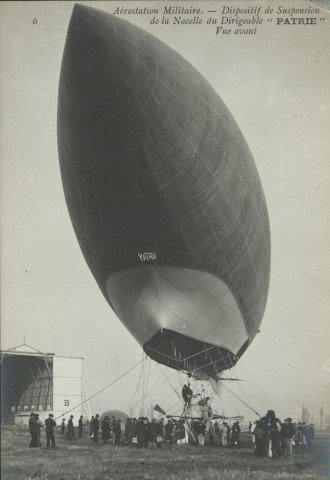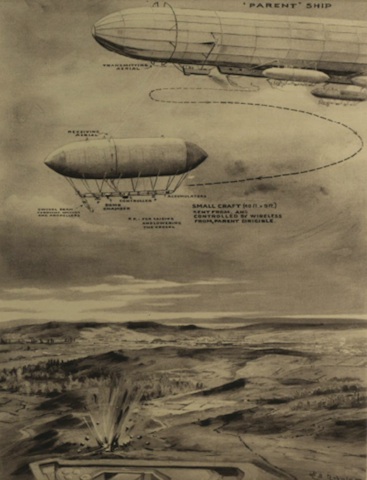In contrast to the King's message to the RAF, Flight's reaction to the end of the war, in the same issue of 14 November 1918, seems rather grumpy. It's true that the editorial section is rounded off, on p. 1274 (source), by a short section which expresses a certain amount of glee at the news of the Armistice:
But the effect of the sudden end is too stunning for us to think coherently of anything but the one great glorious fact -- the WAR HAS ENDED.
But it's mostly preceded by a series of complaints and warnings to Lloyd George's coalition government, telling them what the country expects of them. (I'm not sure that an aviation trade magazine was the first place senior politicians turned to in order to take the pulse of the nation, but I guess if you've got a soapbox, you may as well use it!)
The main concern, on p. 1272 (source), was the nature of the forthcoming peace settlement.
We are in a state now of suspended hostilities -- not of final peace. True, we have imposed such terms on the enemy that render it utterly impossible for him to resume the War, but we must in nowise lose sight of the fact that the real position is this: The soldiers have done their part in reducing the enemy to a state of impotency in which he is prepared to be told what we will have him to do and to do it, but now comes the turn of the politicians and the diplomatists, who have it in their power to undo all that our arms have secured for us.
I've added the emphasis there, as it sets the tone for the rest of the piece: clearly there's little trust given to Britain's leaders. But what exactly does Flight want them to do? The leader continues:
Let it be said at once that we do not for a moment suppose that there is any likelihood of the extreme happening, but we are by no means so certain that the civilian representatives who will draw up the final terms are as determined to punish Germany to the utmost for her crimes as the country would have them.
OK, so maybe Flight did know the nation's mind, after all! More specifically, the question was: who is going to pay for the war? (A total cost, for all belligerents, is given as £60 billion.)
Germany began the War as an aggressor, and we know precisely what would have happened in the matter of indemnities if she had won. Is there any reason why she should be treated any more tenderly than she would have dealt with a defeated Entente ? There is none, and what is more, the people of this country do not intend that she shall. We have not the slightest hesitation in saying that our considered opinion is that if our statesmen lend colour to the theory of the "Hidden Hand" by attempting to let Germany down lightly in the matter of paying for the War, they will be risking a grave upheaval which may carry away with it many of our most cherished institutions.
This is where the leader takes a weird turn, and which one I would have expected more from Flight's rival, C. G. Grey's Aeroplane. The Hidden Hand was the name given to a supposed German conspiracy which was undermining the war effort with the help of members of the British establishment -- the 'first 47,000' -- who were subverted and blackmailed through their sexual perversions. Ridiculous as all this sounds, belief in the Hidden Hand seems to have been fairly widespread (thanks in no small part to Noel Pemberton Billing, as well as to the always popular spy fever and "enemy within" panics). James Hayward described one of the key Hidden Hand myths, that Lord Kitchener's death, when his ship hit a mine and sank near the Orkneys, had been arranged or even faked:
Some attributed his demise to the activities of highly placed Establishment spies, said to include the wife of Admiral Jellicoe, and riots broke out in Islington. Kitchener himself was said to have last been seen in an inappropriate embrace with a subordinate, while on Orkney itself the legend persists that the local lifeboat was ordered not to attend the stricken ship. Mrs Parker was among those not wholly convinced that her brother was dead: one theory ran that he was a prisoner in Germany, another more Arthurian variant was that he was deep in an enchanted sleep in a frozen cave, awaiting his country's next call.1
Sorry for the detour, but it shows the strangeness of the beliefs bundled up with Flight's reference to the Hidden Hand. I'm surprised to see it turning up in a mainstream publication.
The other aspect of that last quote from Flight is the warning -- or threat? -- of revolution: 'a grave upheaval which may carry away with it many of our most cherished institutions'. True, such upheavals were then underway in Germany and Austria-Hungary, so perhaps the feeling was that revolution was in the air. But the revolutions were happening in the defeated powers: it seems a bit over the top to suggest that something similar could still happen to one of the victors, particularly over something so ridiculous as the Hidden Hand.
And just in case the reader missed the Hidden Hand first time around, it turns up again at the end of the page:
As we have said, by letting Germany off the penalty for her crime the Government is playing with fire. However stem the terms we give to the beaten enemy, whatever we exact from him by way of payment on account of the cost of the War, we shall be faced with a sea of trouble during the period of transition which will take all the skill, all the statesmanship we have available to navigate safely. If there is the slightest trace of the influence of the "Hidden Hand," it will not avail, and the future will hold a grave menace to our established institutions.
I wonder how long the Hidden Hand myth survived into this period of transition after the Armistice, when the killing had stopped but the fear and anger clearly remained.
![]() This work is licensed under a Creative Commons Attribution-NonCommercial-NoDerivatives 4.0 International License.
Permissions beyond the scope of this license may be available at http://airminded.org/copyright/.
This work is licensed under a Creative Commons Attribution-NonCommercial-NoDerivatives 4.0 International License.
Permissions beyond the scope of this license may be available at http://airminded.org/copyright/.
- James Hayward, Myths and Legends of the First World War (Stroud: Sutton, 2002), 151-2. [↩]





Jonathan Dresner
The Hidden Hand stuff is pretty dramatic, isn't it? I don't think I've ever heard a Copperhead/Dolschtoss narrative with an emphasis on sexuality before. Religion/ethnicity, sure, but not sexuality.
Brett Holman
Post authorAbsolutely, it's extraordinarily lurid stuff! Hayward seems to suggest that this is mainly the product of one fevered mind; but clearly his ideas had some wider appeal. It's easy to come up with a half-baked theory for the rise of sexual anxieties. On the one hand, so many men were away from home for long periods of time, in camps or overseas, spending their time with other men (with little female companionship except for women of questionable virtue). On the other, women were taking over many previously-male jobs on the home front, where they presumably outnumbered men. All this disruption of traditional gender relations due to the war could easily lead to anxiety about sexual relations which centred around homosexuality in particular (as did the Maud Allan-Pemberton Billing affair), it seems to me. I don't know if anyone has ever looked at the Hidden Hand from a gender perspective -- I don't think anyone much has looked at the Hidden Hand at all -- but I think it would be a fascinating exercise.
BTW, I realised that perhaps the fear/threat of revolution after winning the war was not so silly after all, when one considers that the notion of a "mutilated victory" was to become a crucial element in Fascist propaganda in Italy in the next few years ...
Erik Lund
Kitchener frozen in a cave of ice? That's just stupid. They're thinking of Captain America.
On the other hand, "inappropriate embrace with a subordinate?" Now that's the Kitchener I know.
As for the "Hidden Hand," wasn't it mostly lesbians in Pemberton Billing? On the other hand, all that association with the French... how many snide comments about English public schools do you have to hear before you begin to have some doubts?
And again, Keynes was the fiercest critic of the reparations lobby, at least later on. And we all know about Keynes. And then there was the prewar press campaign against the Kaiser.....
I find myself longing for some kind of quantitative attack on the question of homoerotic innuendo in public life. Is it more prevalent in the Great War era? Can we link it overarching social factors? Mobilisation doesn't do it for me, since the implicit comparison is with World War II. I have a gut sense that demographics, and particularly the relative predominance of the European youth cohort in 1914 is going to be the explanation for any social oddities that come up. If that be the case though, any pan-European phenomena is going to be significantly more prevalent in Germany than in the United Kingdom, with France lagging both.
Jonathan Dresner
I find myself longing for some kind of quantitative attack on the question of homoerotic innuendo in public life.
That may be the best historiographical comment I read all month.
Brett Holman
Post authorErik:
Yes, the trial itself was about lesbianism, but male homosexuality was definitely a big part of the first 47000 stuff. And lesbianism plays into the gender-inversion thing on the home front, anyway, with fewer men around and women doing previously male jobs. It's a good point that the Hidden Hand wasn't repeated in WWII, or at least wasn't as popular, but there are some pretty big differences between the mobilisation in WWI and WWII. I haven't checked this, but my guess is that a bigger proportion of the Army stayed at home between 1940 and 1944, where they obviously weren't being killed or maimed, and there were also a lot of RAF boys at home (although they were being killed). Plus a lot of Americans from 1942 to help keep the womenfolk on the straight and narrow, so to speak, though that would obviously lead to a whole other set of concerns. In WWI, more men in the Army and most of them were in France for most of the war.
As I say, it's just a half-baked idea, and no doubt other factors were at play too. Maybe demographics, as you suggest. Also female suffrage -- that was an unresolved tension in WWI, but had been resolved by WWII. Which reminds me, I'm sure Christabel Pankhurst's conversion to hyperpatriotism and obsession with veneral disease is somehow connected to all this. I think she dabbled in the Hidden Hand stuff too.
Jonathan:
Agreed!
Pingback:
Airminded · The enemy within
Pingback:
The King’s message to the Royal Air Force | Airminded